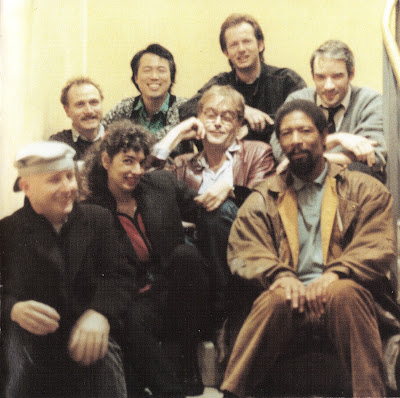Label: FMP
– FMP 0070
Format: Vinyl,
LP; Country: Germany - Released: 1972
Style: Free
Jazz, Free Improvisation
Recorded live January 19, 1972 at Akademie der Künste in
Berlin
Artwork
– Danny, Dietrich Maus, Geges Margull, Gerd Hanebeck, Heiko Hösterey, Krista
Brötzmann, Paul Miron, Peter Paulus, Tomas Schmit, Toon Lem, Winfried Gaul,
Wulf Teichmann
Producer
– P. Kowald
Recorded
By – Eberhard Sengpiel
Supervised
By – Jost Gebers
"It
was recorded at a concert in Berlin, during a Free Music Festival January 19,
1972 , and is a thoroughly excellent example of the kind of music to be heard
at such events all over Europe....this LP is highly recommended."
A1 - Platte
Talloere . . . 13:16
A2 - Wenn
Wir Kehlkopfoperierte Uns Unterhalten . . . 7:06
B1 - Pavement
Bolognaise . . . 14:00
B2 - Guete
Luuni . . . 2:49
Peter
van de Locht: alto saxophone
Günter
Christmann: trombone
Paul
Rutherford: trombone
Peter
Kowald: double bass, tuba, alphorn
Paul
Lovens: percussion
The informal freemasonry among European practitioners of the
New Music grows daily stronger. Although the Continentals are rarely allowed to
play here (thanks to antiquated regulations), British musicians now regularly
cross the Channel to appear side-by-side with the best players Europe has to
offer.
This album represents just such a collaboration, with
trombonist Paul Rutherford taking his place in the band of German
multi-instrumentalist, Peter Kowald, which itself contains one Belgian (van de
Locht) and one Dutchman (Lovens).
It was recorded at a concert in Berlin, during a Free Music
Festival last January, and is a thoroughly excellent example of the kind of
music to be heard at such events all over Europe.
The work of the trombone team is what catches the ear first;
Rutherford produces his vast array of technical effects, and manages to make
music out of them all the time. Near the end of “Pavement Bolognaise”, for
instance, he plays a long unaccompanied passage made up of long, low growls,
ending with a delicious smear, which is quite riveting.
Christmann is a rather more straightforward player (though
not much) and makes a fine complement. When he, Rutherford, and Kowald (on
Alphorn, I think) play together on the short “Guete Luuni”, the effect is like
a brass band lament from outer space.
The leader himself has some impressive moments on bass,
particularly on “Platte Talloere”, where he plays a long solo made up of
strange scratching sounds (caused by pressing the bow down hard on the strings)
and is beautifully accompanied by Lovens – who seems to have calmed down a lot
since I first heard him a couple of years ago.
Van de Locht sounds like a very promising young musician,
giving his best work in the ensemble improvisations, when he provides an upper
line with a poignant, bitter-sweet flavor.
A quintet, then, which is integrated as well musically as it
is nationally; and a LP of informal, enjoyable music, which is highly
recommended.
_ By RICHARD WILLIAMS
from: Melody Maker, June 17, 1972
If
you find it, buy this album!






































